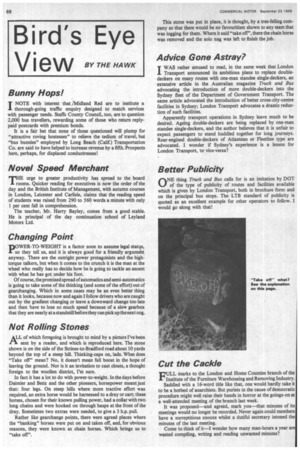Bird's Eye
Page 90

If you've noticed an error in this article please click here to report it so we can fix it.
ViewBY THE HAWK
Bunny Hops!
NOTE with interest that jMidland Red are to institute a thorough-going traffic enquiry designed to match services with passenger needs. Staffs County Council, too, are to question 2,000 bus travellers, rewarding some of those who return replypaid postcards with premium bonds.
It is a fair bet that none of those questioned will plump for "attractive roving hostesses" to relieve the tedium of travel, but "bus bunnies" employed by Long Beach (Calif.) Transportation Co. are said to have helped to increase revenue by a fifth. Prospects here, perhaps, for displaced conductresses!
Novel Speed Merchant
rE urge to greater productivity has spread to the board ooms. Quicker reading for executives is now the order of the day and the British Institute of Management, with autumn courses in London, Leicester and Carlisle, claims that the reading speed of students was raised from 290 to 560 words a minute with only 1 per cent fall in comprehension.
The teacher, Mr. Harry Bayley, comes from a good stable. He is principal of the day continuation school of Leyland Motors Ltd.
Changing Point
DOWER-TO-WEIGHT is a factor soon to assume legal statiis, so they tell us, and it is always good for a friendly argument anyway. There are the outright power protagonists and the hightorque talkers, but when it comes to the crunch it is the man at the wheel who really has to decide how he is going to tackle an ascent with what he has got under his foot.
Of course, the promised spread of automatics and semi-automatics is going to take some of the thinking (and some of the effort) out of gearchanging. Which in some cases may be an even better thing than it looks, because now and again I follow drivers who are caught out by the gradient changing or leave a downward change too late and then have to lose so much speed because of a slow gearbox that they are nearly at a standstill before they can pick up the next cog.
Not Rolling Stones
Al of which foregoing is brought to mind by a picture I've been sent by a reader, and which is reproduced here. The stone shown is on the side of the Strines-to-Bradford road about 10 yards beyond the top of a steep hill. Thinking-caps on, lads. What does "Take off" mean? No, it doesn't mean full boost in the hope of leaving the ground. Nor is it an invitation to cast clouts, a thought foreign to the woollen district, I'm sure.
In fact it has a lot to do with power-to-weight. In the days before Daimler and Benz and the other pioneers, horsepower meant just that: four legs. On steep hills where more tractive effort was required, an extra horse would be harnessed to a dray or cart; these horses, chosen for their known pulling power, had a collar with two long chains and were hooked on through hasps at the front of the dray. Sometimes two extras were needed, to give a 3 h.p. pull.
Rather like gearchange points, there were agreed places where the "banking" horses were put on and taken off, and, for obvious reasons, they were known as chain horses. Which brings us to "take off". This stone was put in place, it is thought, by a tree-felling company so that there would be no favouritism shown to any team that was logging for them. Where it said "take off", there the chain horse was removed and the solo nag was left to finish the job.
Advice Gone Astray?
T WAS rather amused to read, in the same week that London 1 Transport announced its ambitious plans to replace doubledeckers on many routes with one-man standee single-deckers, an extensive article in the Australian magazine Truck and Bus advocating the introduction of more double-deckers into the Sydney fleet of the Department of Government Transport. The same article advocated the introduction of better cross-city-centre facilities in Sydney; London Transport advocates a drastic reduction of such facilities.
Apparently transport operations in Sydney leave much to be desired. Ageing double-deckers are being replaced by one-man standee single-deckers, and the author believes that it is unfair to expect passengers to stand huddled together for long journeys. Rear-engined double-deckers of Atlantean or Fleetline type are advocated. I wonder if Sydney's experience is a lesson for London Transport, or vice-versa?
Better Publicity
ONE thing Truck and Bus calls for is an imitation by DOT of the type of publicity of routes and facilities available which is given by London Transport, both in brochure form and on the principal bus stops. The LTB standard of publicity is quoted as an excellent example for other operators to follow. I would go along with that!
Cut the Cackle
FULL marks to the London and Home Counties branch of the Institute of the Furniture Warehousing and Removing Industry. Saddled with a 16-word title like that, one would hardly take it to be a hotbed of anarchists. But purists in the cause of democratic procedure might well raise their hands in horror at the goings-on at a well-attended meeting of the branch last week.
It was proposed—and agreed, mark you—that minutes of its meetings would no longer be recorded. Never again could members have a surreptitious snooze whilst a dutiful secretary intoned the minutes of the last meeting.
Come to think of it—I wonder how many man-hours a year are wasted compiling, writing and reading unwanted minutes?








































































































































































































































































































































































